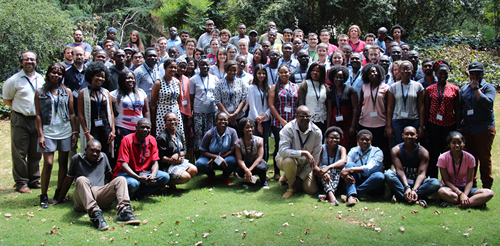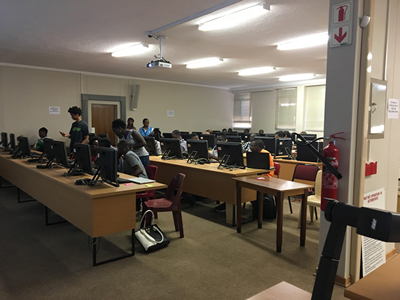The NWU Center for Space Research and NWU eResearch, in conjunction with the Centre for High Performance Computing (CHPC), hosted the 8th CHPC Introductory summer school at the Potchefstroom site.

The students, researchers and instructors participating in the programming school
The summer school was the largest programming school in Africa to date and hosted 80 participants from all the universities in South Africa and was aimed at post-graduates, postdocs, and researchers. Participants ranged from post-graduate students to senior researchers from around the country, representing diverse field, such as physics, engineering, agricultural sciences, linguistics, mathematics, chemistry, engineering, bioinformatics, etc. and did not all have prior knowledge of linux or python programming.The school ran from 15 to 20 January 2018, and was a mix of lectures and practical exercises introducing the participants to the use of the Ubuntu Linux operating system, the Python programming language, and the use of large computer clusters. “The biggest scientific challenges in the coming decade will be solved by computer algorithms and it is therefore important that our students and researchers are able to effectively develop and use computers and computer models.” says Dr Du Toit Strauss from the NWU’s Centre for Space Research. One of the main objectives of the CHPC is to become globally competitive and to accelerate Africa's socio-economic upliftment through the effective application of high-end cyberinfrastructure and this can only be achieved if the scientist of tomorrow have the necessary skills and knowledge. “The South African government has identified capacity building in the use of high performance computing resources as a strategic goal and the CHPC fulfills this mandate by providing training opportunities such as this school.” adds Dr Daniel Moeketsi from the CHPC. “NWU eResearch is proud to host this programming school and hope to do so again next year. The NWU is committed to providing world class computer infrastructure and training for our students and researchers.” concludes Mr Martin Dreyer from NWU eResearch, Information Technology department. The CHPC, located in Cape Town, is part of the Council for Scientific and Industrial Research and funded by the Department of Science and Technology. The CHPC continues to host these type of summer schools across the country and African continent to enable the researchers in Africa to fulfill the CHPC mission to provide world-class HPC that enables cutting-edge research with high impact on the South African Economy.
The school itself
The course is a hands on approach with participants spending six full days doing practical exercises in a computer lab that has been set up to the required specifications needed by the CHPC for the school.
Day 1 and 2
Day one started of with welcoming and introductions by the NWU Chief Director IT Mr Boeta Pretorius who welcomed everyone to the NWU. The participants then went on to learn about the basic commands in Linux and how to navigate the file system and getting help within the terminal ending up with how to use simple text editors such as nano. Day two kicked off with the participants learning the linux file system in depth with pipes and filters and concluded with students writing their first shell script and submitting it to the cluster.
Day 3 to 6
During day 3 to 6 participants started off with basic python commands and syntax use. They then moved on to more advanced function and using matplotlib with python and the use of advanced mathematical packages such as numpy and scipy. On the last day the participants had the opportunity to access the CHPC Cluster and submit a job on the cluster.
The NWU is looking forward to partner with the CHPC and host this event again in the future.

Participants helping each other to keep up with the Python lesson
